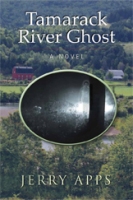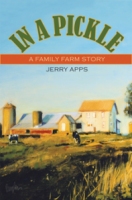 by Jerry Apps, author of The Great Sand Fracas of Ames County
by Jerry Apps, author of The Great Sand Fracas of Ames County
When I first heard about the successes with hydraulic fracturing as a new way to extract natural gas and oil buried deep in the bedrock of several regions of the American Northeast, West, and Southwest, I was intrigued. But I was also skeptical about the promise of job opportunities and economic development offered by this relatively new technique.
 Then I learned that the special kind of sand needed for the fracturing process could be found primarily in Wisconsin and parts of Minnesota and southeast Iowa. As a native of the “sand counties” of Wisconsin, I became even more interested and concerned. After many decades of working in and observing rural Wisconsin, I’ve learned that usually what sounds so good—more jobs and economic development—often has a down side, too.
Then I learned that the special kind of sand needed for the fracturing process could be found primarily in Wisconsin and parts of Minnesota and southeast Iowa. As a native of the “sand counties” of Wisconsin, I became even more interested and concerned. After many decades of working in and observing rural Wisconsin, I’ve learned that usually what sounds so good—more jobs and economic development—often has a down side, too.
I began reading newspaper reports that said frac sand mining was spreading, and that companies were buying entire farms in western Wisconsin to turn them into frac sand mines. I contacted the Wisconsin Geological and Natural History Survey offices, and from the WGNHS I learned more about hydraulic fracturing and especially about sand mining—what it is, how it is done, and some of the challenges it presents.
By then I knew that the topic of frac sand mining would fit perfectly within the series of books I’ve been writing about a fictional county in Wisconsin, my Ames County saga. So far I have written five novels, all published by the University of Wisconsin Press and focusing on issues the people in that county have faced in past and recent history: soil conservation, land use planning, water pollution, and large-scale farming.
 So that’s how the idea for the new novel, The Great Sand Fracas of Ames County, was born. I continued reading reports from many Wisconsin newspapers to see the ways local people were debating whether and how to allow frac sand mines to open in their communities.
So that’s how the idea for the new novel, The Great Sand Fracas of Ames County, was born. I continued reading reports from many Wisconsin newspapers to see the ways local people were debating whether and how to allow frac sand mines to open in their communities.
Many people saw sand mining as an economic bonanza bringing much-needed jobs and tax revenues to their communities. Others worried greatly about environmental effects: processing the sand requires great amounts of water; fine dust from the process can cause respiratory problems; rivers and streams could become silted or contaminated with runoff; lights, noise, trucks and trains would transform the quiet countryside.
And, as is often the case with new endeavors, especially those expanding rapidly, laws and rules governing frac sand mining lag well behind the growth of the industry. Sand mining rapidly became a political issue, forcing local officials to vote yea or nay on zoning, regulations, taxation, and other policy issues regarding the mines.
In many of the communities affected, especially in western Wisconsin, emotions flared. Citizens who once were friends became adversaries as they took positions for or against a frac sand mine in their neighborhood.
In my novel The Great Sand Fracas of Ames County, I illustrate how a small Wisconsin community (fictional Link Lake) copes with the possibility of a sand mine opening in the location of their revered community park. The local historical society becomes involved when the sand mine officials declare that they must cut down the Trail Marker Oak, a historic landmark along an old Menominee trail, to gain access for large equipment. With the hope for increasing the tax base and keeping more jobs in the village, the Link Lake Village Board approves leasing the park to the mining company, with a resulting uproar that divides everyone in the village.
Through fiction I’ve tried to illustrate, in an entertaining way, how complicated local development issues can be. Too often emotions can trump logic, historic fact, and scientific findings. Clear thinking can disappear in a cloud of angry words.
 In cases such as my Ames County story, and in my other five novels that all take place in this fictional Wisconsin county, I advocate the need for critical thinking, which allows for economic, environmental, historical, and political views to be examined in a clear-headed and deliberate way to make wise choices for our present and our future.
In cases such as my Ames County story, and in my other five novels that all take place in this fictional Wisconsin county, I advocate the need for critical thinking, which allows for economic, environmental, historical, and political views to be examined in a clear-headed and deliberate way to make wise choices for our present and our future.





One comment